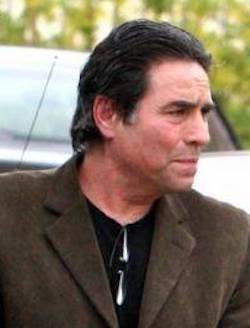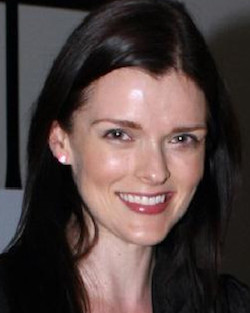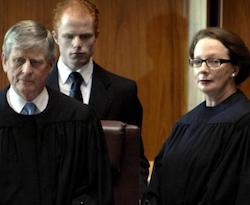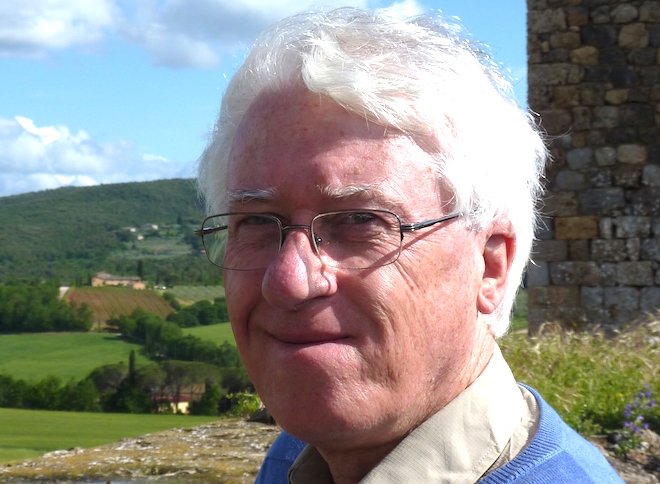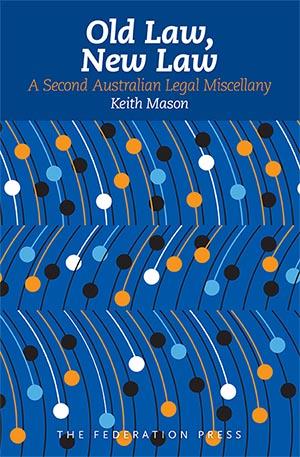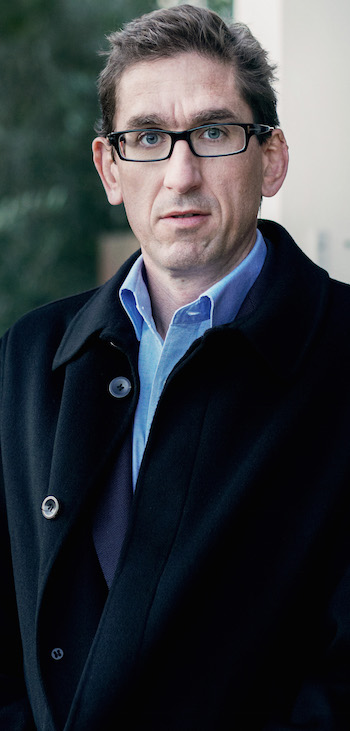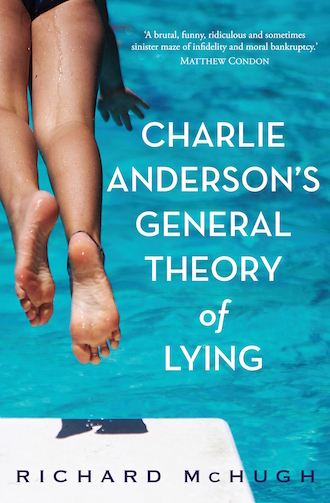Choice cuts from Ian Hancock's biography of Tom Hughes, A Cab on the Rank ... A painful move from 11 Selborne ... Skyrocketing fees ... Great cases ... Lionel Murphy - "not an easy client" ... Diary observations of judges, barristers and bar etiquette
![]() Hughes and his biographer (Federation Press)
Hughes and his biographer (Federation Press)
IAN Hancock's tour de force biography of Sydney bar lion T.E.F. Hughes QC takes us through the subject's comfortable beginnings, the war, the law, politics, and back to the law in a life replete with garlands and laurels.
Hancock, an editorial fellow of the Australian Dictionary of Biography and historian at the ANU, who has made a career carving the lives of Liberal politicians in print, had access to Hughes' personal diaries and, just as importantly, his fee books.
Hughes is one of those grandee heroes that the dormitory hothouse of the bar occasionally produces. That is not to say his life was always easy. For many years he yearned for the happiness his parents had found, but had eluded him.
In the 1970s, with his marriage to Joanna Hughes failing, he pursued numerous glamorous women, including Kate Weigall, PR impresario Deeta Colvin and actress Kate Fitzpatrick.
Hughes proposed marriage to Fitzpatrick and she in turn described him as "sweet". She seemed far more smitten by Murray Gleeson, saying he was the sexiest man she had ever met.
Michael McHugh told a bar function in 2013: "Poor Kate, she must have led a sheltered life."
But Kate Weigall was a huge presence in Hughes' life. Relatively soon after they met she was named as a co-respondent in the divorce from Joanna.
Weigall went to the bar in 1976 and at that stage Tom was chairman of 11 Selborne. In the following year he moved for her appointment to the next vacancy on the floor.
This was approved by the board, consisting of Hughes, Doug Staff, Dick Conti, Simon Sheller, Vince Bruce and Jenny Blackman. Subsequently, when Hughes was absent from Sydney, members of the floor met and voted against her admission.
There was much intrigue with another board meeting called to pass a resolution "as a mere formality" to accept Weigall's application.
Frank McAlary told Hughes "this will be painful". Twenty members of the floor objected to Weigall's membership and wanted a rescission motion. Hughes though this "would be a distinct breach of contract and quite dishonourable".
![]() Dancing Frank McAlary: warned Hughes
Dancing Frank McAlary: warned Hughes
McAlary said he was not interested in the legal position and at a subsequent meeting of the board he arrived in Hughes' chambers with a petition containing 18 signatories and two names typed, but not signed.
Paragraph one read:
"We take the view that it is contrary to the best interests of the Floor to allocate the next available room to anyone in advance, thereby denying the Floor the opportunity to select the best available applicant when the occasion arises."
Nonetheless, the board voted two votes to one to admit Weigall to membership (Sheller and Hughes - for; Bruce - against; Blackman abstaining).
Within a week Hughes decided to leave 11 Selborne and in a letter to Conti said:
"Katie is close to broken: but I think that her inner strength will just pull her through and keep her at the Bar. There is, of course, no way of her staying on the floor and she is looking in other directions.
It goes without saying that I am appalled and disgusted by the cruelty and injustice of it all ... I was naïve enough once to think that escape from politics would bring me back to a gentlemanly environment."
Six of the petition signatories urged him to stay and said they regretted any misunderstanding. It was to no avail and Hughes moved to 16 Wardell in Martin Place. Hancock says that the floor was aware that Hughes, as chairman, "was not enamoured of participatory democracy" and later he accepted he bore responsibility for the "schism" at 11 Selborne.
A one man money machine
![]() Jolly John Gorton: questioned fee arrangement with Hughes
Jolly John Gorton: questioned fee arrangement with Hughes
Hughes regularly had doubts about whether he could get enough work, but by 1977 he was busy and commanding fees of up to $1,500 a day. He also developed his distinctive court room manner, holding himself ramrod erect, standing side-on and staring at a fixed point towards the back of the courtroom as he peppered witnesses with questions. Another peculiarity was to stand with one arm outstretched, his hand raised, glaring at his fingernails.
At a dinner to mark Hughes' and Chester Porter's 50th anniversary of admission to the bar, Ian (Hormones) Harrison said that the technique of staring towards the rear of the courtroom "has unintended consequences ... members of the public gallery often break down and answer his questions".
In the defamation case brought in 1971 by former prime minister John Gorton against the ABC and the journalist Max Walsh, Hughes' costs were $2,150. Russell Fox in the ACT Supreme Court only awarded Gorton damages of $7,500, with the defendants to pay half his costs.
Gorton was asked by his solicitors to confirm that Hughes had charged full fees or whether there might be a private arrangement regarding costs. In fact, Hughes was charging Gorton $250 a day compared to his usual rate of $500.
Gorton was concerned and wrote:
"Is it illegal, or unethical, or something, for us to pay you half the cost of your full fees, recover the other half from the defendants, and make some arrangement about distribution of the amount recovered?"
The answer to that question was not found in the book.
By 1977, when too many were wanting to hire this particular cab on the rank, Hughes quoted $3,000 on brief and $2,000 a day in court, which generally put them off. His usual rate was $1,000 a day and $3,200 for conferences and opinions. In 1977 he grossed just over $290,000 in fees.
In August 1979 for the Leon Punch v Fairfax defamation case he received $18,700. On one day in that same month he entered an amount of $1,200 into his fee book and noted: "I need it all, because ... the bite of inflation into my earnings is unpleasantly noticeable."
In 1979 Hughes went to the Privy Council, acting in a case for Fiji's Suva City Council. He was successful and received a fee of $40,000, as well as $200 a day living expenses.
K.H. Gifford QC of the VicBar appeared in the Privy Council for the appellants, and Hughes had a very dim view of him:
"Gifford is incredibly gauche: he is rude; he interrupts; he asks rhetorical questions; he gesticulates; he is thoroughly frightful and he sets my teeth on edge ..."
While in England he went to Oxford with future son-in-law Malcolm Turnbull to a debate at the Union in support of the question: "That the private lives of public figures should be solely their own concern."
Clement Freud spoke against the motion and clashed with Turnbull. Hughes noted in his dairy, Malcolm "will have to learn the art of taking it on the chin".
![]() Aitken: lunch with Hughes
Aitken: lunch with Hughes
While in London, Hughes bought silver spoons and forks in New Bond Street, a new suit in Jermyn Street and lunched with Jonathan Aitken, later jailed for perjury in a defamation case he brought against The Guardian and Granada TV.
All in all, 1979 was another bountiful year - Hughes received nearly $320,000 in fees, worth close to $1.5 million in 2014 money, and that did not take into account retainers from Packer, Fairfax and others.
The following year his fee book recorded the highest amount he charged for a refresher - $2,700, and for most of the year he asked $1,600 a day in court, which edged up to between $1,800-$2,000 a day.
Still, he was concerned about getting work. At one point he noted he did not have a case in court following the Easter break, "which always fills me with neurotic thoughts about what is happening to my practice".
In the same week he entered $6,950 as payments for seven conferences and two opinions.
For 1980, his fees were just shy of $400,000.
Acting for former chief stipendiary magistrate Murray Farquhar in his criminal trial, Hughes negotiated $1,600 a day with $12,000 in hand.
For Elizabeth Evatt's defamation case against Fairfax he collected a fee of $16,000. In 1984 he could charge $2,500 a day and two years later it was $3,000-$3,250, plus $5,000 for preparation and advice.
By the end of 1986 he was regularly charging $3,000-$3,500 a day and 10 years later he could ask for $6,000. In 1996, when he turned 73, his fee books recorded total charges of $1,582,015 and he was never out of work.
In the the early 80s, his retainer from Packer was $50,000 a year.
In the 1987 case he took for Robert Holmes à Court's Oil Basin Ltd in a royalty dispute with BHP, he was paid over $200,000 in fees and expenses between February and August that year. In 1988-89, acting for Last Resort Laurie Connell and Rothwells in the "success fee" case against Fairfax, and Young Warwick of the same name, he collected nearly $300,000, after total legal costs of $3.2 million.
By 2009, acting for Gina Rinehart in her action against Rose Porteous, Hughes was on $7,500 a day, rising to $8,500 and overall he collected $312,750 for the case, which ultimately was settled.
Channel Seven had him on a retainer of $50,000, dating back to 2007 and Tom Hughes Jnr on $25,000, but that ended after the network lost the Mercedes Corby case in 2008.
The briefs started to dry up after he turned 85. In February 2010 his diary recorded, "a very bleak start to the year".
Enough about filthy money - Hancock has other delights in store.
Lionel Murphy
![]() Murphy: dumped Hughes, twice
Murphy: dumped Hughes, twice
Hughes acted for Lionel Murphy before senate committees investigating the "my little mate" affair, in the High Court on a constitutional issue and before the Court of Appeal where he succeeded in getting a new trial for the High Court judge after he was found guilty of perverting the course of justice.
When Murphy was appointed to the High Court in 1975, filling the vacancy created by the death of Douglas Menzies, the Victorian bar was apoplectic and debated this motion: "it is essential that positions on [the High Court] should be offered only to persons who are pre-eminent within the legal profession and whose fitness for office is not a matter of public controversy."
The motion was defeated 188 votes to 64. Garfield Barwick also disliked the appointment, telling Gough Whitlam that Murphy was "neither competent nor suitable". However, the chief justice contacted Hughes, who was then president of the NSW bar, and said that any protest action would be inappropriate.
Hughes accepted this and made a warm speech of welcome at Murphy's swearing-in, quoting Dangerfield's The Strange Death of Liberal England: "It could not be said of Your Honour that, like Asquith's Liberals, you advanced upon reform with noisy mouths and mouse-like feet."
VicBar chairman Richard McGarvie read Hughes' speech to his council.
By 1984 Murphy was in trouble following publication of The Age tapes, where it was alleged that the High Court judge had been recorded talking to his friend Sydney solicitor Morgan Ryan, who faced charges of forgery and conspiracy.
Clarrie Briese, the NSW chief stipendiary magistrate, came out and said that on two occasions in January 1982 Murphy had tried to influence him into intervening with the magistrate in the Ryan committal. This culminated in the famous question that Briese said Murphy asked him: "And now what about my little mate?"
Hughes had been a contemporary of Murphy's at law school and had appeared against him in the Charlie Oliver v Alan Reid defamation case - but he was "not an easy client".
Before the senate committee Hughes attempted to demolish Briese's evidence as well as submitting that parliament didn't have the power or jurisdiction to determine whether a federal judge was guilty of misbehaviour. "Proved" misbehaviour, he said, "lay within the ambit of the judicial power of the Commonwealth and nowhere else".
The senate committee tabled its report on August 24, 1984, with findings split along party lines. Another senate committee was appointed with Theo Simos QC assisting on points of law. This committee was allowed to examine and cross-examine witnesses, and it had new evidence from Judge Flannery of the District Court, who said Murphy had referred him to a recent High Court ruling on conspiracy two days before he was to preside over the Ryan trial.
Hughes grilled Briese, and Janet Hawley in The Age reported that he, "poured on withering righteous indignation with long sweeping stares around the room, as Mr Briese looked uncomfortable or downright annoyed ..."
Murphy declined to appear before the second senate committee, and privately Hughes thought that was a mistake - he should have used the opportunity to confront and quash Briese's allegations. Three members of the committee reported that on the balance of probabilities Murphy had tried to influence the committal proceedings against Morgan Ryan.
DPP Ian Temby announced that Murphy would be charged with two counts on attempting to pervert the course of justice.
On February 8, 1985 Hughes and his wife Chrissie attended a dinner thrown by Sydney socialites Snow and Georgie Swift. Gough and Margaret Whitlam were also there, and Hughes' diary reads:
"Everyone was sparkling, the conversation rolled at breakneck speed. The food and wine were perfect. Pink Bollinger before dinner. Gough agreed with me that Murphy is a graceless person."
Murphy had decided to use Alec Shand for his trial. On July 5, 1985 a District Court jury found the judge guilty on one count, relating to Briese's allegations.
There was an unsuccessful High Court challenge on whether legislation vesting federal jurisdiction in state courts was valid and here Hughes was back in the case for Murphy, but led by Maurice Byers. There were 21 reserved questions of law for the Court of Appeal and 19 grounds of appeal against conviction.
It was submitted that Murphy never used the word "mate" and that if he had asked the question in French it would be legitimate to show that the High Court judge didn't speak French. Street CJ asked Hughes to put the question in French, which he did: "Eh bien, Clarrie, et maintenant comment va mon petit copain."
The Court of Appeal (Street, Hope, Glass, Samuels and Priestley) ordered a retrial, and again Murphy dumped Hughes, hiring Ian Barker. The judge was acquitted April 29, 1986. More allegations surfaced and a parliamentary committee of three retired judges was appointed to inquire further into 14 matters, but the investigation was abandoned after Murphy died of inoperable cancer.
Hughes wrote to Murphy's widow, Ingrid:
"For all of you the unjust ordeal of the past three years has been a journey through the darker extremities of human experience. Yet you and Lionel bore it with consummate dignity, a quality equalled only by the courage and endurance which marked all of you during a period of stress which no one should have undergone.
I shall always have fond memories of Lionel. Although we spent the major part of our respective careers on opposite sides of one fence or another, there was never any rancour, indeed there was nothing but essential comradeship between us.
I counted it as a very considerable honour to be asked to appear as his counsel at several stages of his trial by ordeal."
A different someone from the "graceless person".
Scratchings in the diary
![]() Barwick: advised not to sue David Marr
Barwick: advised not to sue David Marr
Some of Hughes' diary observations about judges, other barristers and the bar are interesting.
The architect John Andrews and his company brought defamation proceedings against Fairfax and other newspapers for claiming a building he designed in Canberra leaked "like a sieve".
It went to the Court of Appeal, which ordered a new trial to assess Andrews' personal damages which at $300,000 it thought excessive.
Hughes observations of the appeal judges, Frank Hutley and Harold Glass, went like this:
"Hutley cannot stop talking [and] Glass joins him in cross-interruptions. [They] try to ape the High Court by resorting to the Socratic dialogue; unfortunately they are an intellectually inferior breed of judicial monkey."
Elizabeth Evatt, the chief judge of the Family Court, sued Fairfax over a Sun-Herald article, that accused her of controlling the destruction of fathers' and children' lives "with the same cold-blooded efficiency that Ilsa Kuhn and her like used in disposing of Jews in Auschwitz and Belsen".
Hughes appeared for Evatt and the Melbourne QC Neil McPhee for Fairfax. Hughes had been on a retainer with Fairfax, but because McPhee was briefed in his stead he told the company's solicitor, Graham Bates at Stephen Jaques & Stephen, that he felt he was free to take work against Fairfax. When told of this, Bates replied, "Oh God."
The diary records that McPhee's cross-examination of the chief judge was "rugged and full of sneers". Evatt broke down in tears while McPhee was trying to extract an admission that her hurt was "contrived".
Hughes wrote that McPhee's manner of conducting the case was, "completely attuned to the taste of the wild men of Jones Street [Fairfax's headquarters]. I could never conduct a defence to this kind of case in the same way."
McPhee's final address, which lasted just over two-and-a-quarter hours, "was not lacking in misrepresentation, particularly inasmuch as he stated that I had sought to protect the plaintiff from hard cross-examination on the grounds that she is the chief judge of the Family Court".
Garfield Barwick also sought Hughes' advice about David Marr's biography of the chief justice. Barwick didn't want people accepting Marr's version that he had "instigated Kerr's action" against the Whitlam government. He feared that this claim, "even though made by a person perhaps of little worth", would get wide circulation.
![]() Hughes said he would represent Barwick without fee, but advised against legal action. Hughes believed that Barwick had "erred in principle" in advising Kerr in November 1975. He though the advice was "legally unimpeachable", but added:
Hughes said he would represent Barwick without fee, but advised against legal action. Hughes believed that Barwick had "erred in principle" in advising Kerr in November 1975. He though the advice was "legally unimpeachable", but added:
"No judge in whom the judicial power of the Commonwealth is vested should participate in any way in the exercise of executive power."
He noted that it was fortunate there was no legal challenge to Kerr's withdrawal of Whitlam's commission, as Barwick (and Mason and probably Murphy) would have had to disqualify themselves.
Finally, Hughes and Bob Ellicott, in 1991, circulated a letter to all members of the bar deploring the emergence of "tickets" for the coming bar election.
Whoever would have imagined such a thing!
 Walmsley: Lionel liked to help people
Walmsley: Lionel liked to help people If you were on death row, what would you request for your last meal?
If you were on death row, what would you request for your last meal? 

















































